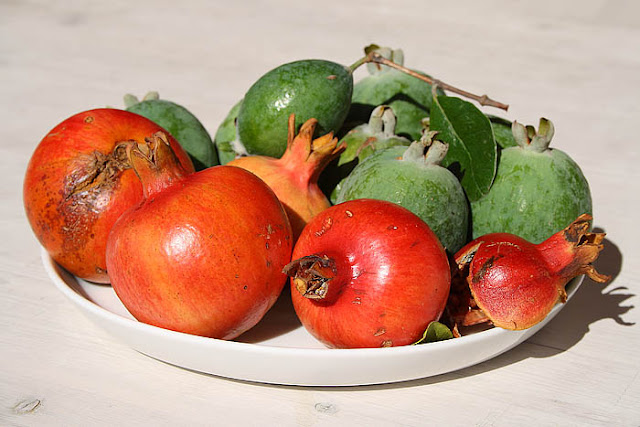Pomegranate (Punica granatum), is a fruit-bearing deciduous shrub or small tree growing between five and eight meters tall.
Native to the area of modern day Iraq and Iran, the pomegranate has been cultivated in the Caucasus since ancient times. From there it spread to the Himalayas in Northern India. Today, it is widely cultivated throughout the Mediterranean region of southern Europe, the Middle East, northern Africa and tropical Africa, Indian subcontinent and the drier parts of Southeast Asia. It was introduced into Latin America and California by Spanish settlers in 1769.
The fruit of this beautiful tree is extremely beneficial for health — in the Indian subcontinent's ancient Ayurveda system of medicine, the pomegranate has been used as a source of traditional remedies for thousands of years.
The rind of the fruit and the bark of the pomegranate tree is used as a traditional remedy against diarrhoea, dysentery and intestinal parasites. The seeds and juice are considered a tonic for the heart and throat, and the astringent qualities of the flower juice, rind and tree bark are considered valuable for a variety of purposes, such as stopping nose bleeds and gum bleeds, toning skin, (mixed with mustard oil) firming-up sagging breasts and treating haemorrhoids. Pomegranate juice (of specific fruit strains) is also used as eye drops as it is believed to slow the development of cataracts.
Pomegranate has been used as a contraceptive and abortifacient by means of consuming the seeds, or rind, as well as by using the rind as a vaginal suppository. This practice is recorded in ancient Indian literature, in Medieval sources, and in modern folk medicine.
A lot of natural remedies would probably do just as well as the pill without its side effects (such as cardiovascular diseases or breast cancer, to name but few), but the pharmaceutical industry would flip its collective lid since that would make it lose part of its succulent benefits.
Pomegranate aril juice provides about 16% of an adult's daily vitamin C requirement per 100 ml serving, and is a good source of vitamin B5 (pantothenic acid), potassium and natural phenols, such as ellagitannins and flavonoids.
The edible seeds are rich in fibre and unsaturated oils and other micronutrients.
Juice of the pomegranate may be effective in reducing heart disease risk factors.
In a limited study of hypertensive patients, consumption of pomegranate juice for two weeks was shown to reduce systolic blood pressure by inhibiting serum angiotensin-converting enzyme. Juice consumption may also inhibit viral infections while pomegranate extracts have antibacterial effects against dental plaque.
Feijoa or Acca sellowiana, a species of flowering plant in the myrtle family, Myrtaceae, is native to the highlands of southern Brazil, eastern Paraguay, Uruguay, northern Argentina and Colombia.
Not only is feijoa fruit an exquisite treat, but also its pulp is used in some natural cosmetic products as an exfoliant, what is more, the sweet scent of the fruit resembles fine perfume.
+fruits+and+pomegranates+(Punica+granatum).jpg) |
| Pineapple guava (Feijoa sellowiana) fruits and pomegranates (Punica granatum) (© 2012 LightColourShade. All rights reserved) |
+fruits+and+pomegranates+(Punica+granatum)+close-up.jpg) |
| Pineapple guava (Feijoa sellowiana) fruits and pomegranates (Punica granatum) close-up (© 2012 LightColourShade. All rights reserved) |
| Pomegranate flower. (© 2012 LightColourShade. All rights reserved) |
 |
| Ripening pomegranate. (© 2012 LightColourShade. All rights reserved) |
 |
| Pomegranate fruit. (© 2012 LightColourShade. All rights reserved) |
The only trouble I see with using pomegranates for medicinal uses would be their exploitation - by unscrupulous growers in California ;)
ReplyDeleteAnd I didn't know that feijoas were guavas. You learn something every day.
I didn't know there was trouble with pomegranate growing in California. Did you mean the fertilisers and pesticides they use? Luckily, I can still find them growing in the wild near here, and, of course, I buy organic pomegranates as well.
DeleteBTW, I wrote about a natural remedy for nosebleeds in the comment on one of your previous posts, did you see it?